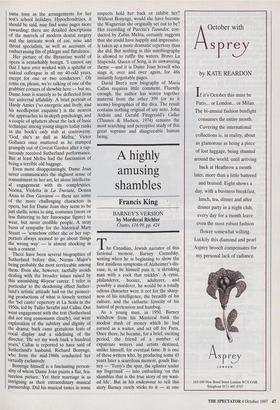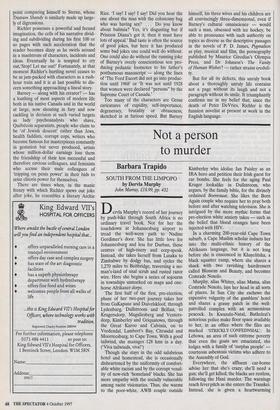A highly amusing shambles
Francis King
BARNEY'S VERSION by Mordecai Richter Chatto, £16.99, pp. 424 The Canadian, Jewish narrator of this fictional memoir, Barney Carnofsky, writing when he is beginning to show the first insidious symptoms of Alzheimer's dis- ease, is, as he himself puts it, 'a shrinking man with a cock that trickles'. A cynic, philanderer, boozer, adulterer, and possibly a murderer, he would be a totally odious character were it not for the sharp- ness of his intelligence, the breadth of his culture, and the cathartic ferocity of his hatred of pretension and humbug.
As a young man, in 1950, Barney withdrew from his Montreal bank the modest stash of money which he had earned as a waiter, and set off for Paris. Once there, he became, for a brief, exciting period, the friend of a number of expatriate writers and artists destined, unlike himself, for eventual fame. It is one of these writers who, by producing some 45 years later a scurrilous memoir, goads Bar- ney — 'Terry's the spur, the splinter under my fingernail' — into embarking 'on this shambles that is the true story of my wast- ed life'. But in his endeavour to tell this story Barney rarely sticks to it — at one point comparing himself to Sterne, whose Tristram Shandy is similarly made up large- ly of digressions.
Richler possesses a powerful and fecund imagination, the cells of his narrative divid- ing and subdividing during his first 109 or so pages with such acceleration that the reader becomes dizzy as he swirls around in a maelstrom of characters, incidents and ideas. Eventually he is tempted to cry out,`Stop! Let me out!' Fortunately, at that moment Richler's hurtling novel ceases to be as jam-packed with characters as a rush- hour train and it is at last possible to dis- cern something approaching a lineal story.
Barney — along with his creator? — has a loathing of most aspects of modern life both in his native Canada and in the world at large, now shouting in fury and now cackling in derision at such varied targets as lady psychoanalysts who shave, Quebecois separatists, people who claim to be 'of Jewish descent' rather than Jews, health faddists, corrupt cops, writers who become famous for masterpieces constantly in gestation but never produced, artists whose million-dollar earnings lose them the friendship of their less successful and therefore envious colleagues, and feminists who accuse their male colleagues of 'tripping on penis power' in their bids to - seize clitoris power for themselves.
There are times when, in the manic frenzy with which Richer spews out joke after joke, he resembles a literary Archie Rice. 'I say! I say! I say! Did you hear the one about the man with the colostomy bag who was having sex? . . . Do you know about bulimia? Yes, it's disgusting but if Princess Diana's got it, then it must have lots of appeal.' Bad taste is often the source of good jokes, but here it has produced some bad jokes one could well do without. One could also do without the running joke of Barney's overly conscientious son pro- ducing pedantic footnotes to his father's posthumous manuscript — along the lines of 'The Ford Escort did not go into produc- tion until 1968' or 'It was not until 1928 that women were declared "persons" by the Supreme Court of Canada.'
Too many of the characters are Grosz caricatures of cupidity, self-importance, degeneracy, brutality or obtuseness, sketched in at furious speed. But Barney himself, his three wives and his children are all convincingly three-dimensional, even if Barney's cultural omniscience — would such a man, obsessed with ice hockey, be able to pronounce with such authority on topics as diverse as the descriptive passages in the novels of P. D. James, Pygmalion as play, musical and film, the pornography published by Maurice Girodias's Olympia Press, and Dr Johnson's The Vanity of Human Wishes? — rather strains creduli- ty.
But for all its defects, this unruly book about a thoroughly unruly life contains not a page without its laugh and not a paragraph without its smile. It triumphantly confirms me in my belief that, since the death of Peter DeVries, Richler is the funniest novelist at present at work in the English language.











































































 Previous page
Previous page